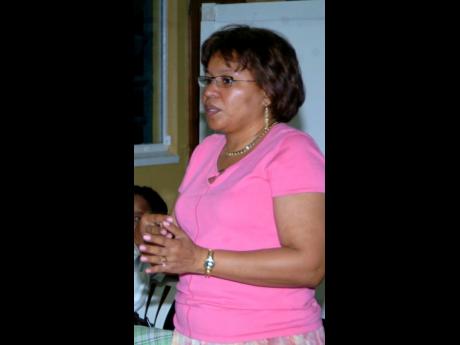‘They could hold the key to save lives’ - Researchers disappointed with low number of plasma donors for local study
Fifty-one patients at the University Hospital of the West Indies (UHWI) have been referred for convalescent plasma clinical trial treatment as local researchers up the ante in the search for a safe and reliable therapy to fight the deadly COVID-19 pandemic.
The trial, which was approved by the Mona Campus Research Ethics Committee in April, has been severely limited in scope due largely to the lack of volunteer blood donors from persons who have recovered from the coronavirus, a senior lecturer in haematology at UHWI has said.
The research team, led by senior lecturer Dr Gillian Wharfe, had its first test treatment in September, but is still awaiting approval from the Ministry of Health and Wellness to proceed further with trials.
The team currently has 12 units of plasma available, further delaying plans to press ahead. The ideal volume would be enough for 30 patients, Wharfe said. “We still need, very much so, a lot more donors,” Dr Magdalene Nwokocha, a fellow researcher at the UHWI, said.
The researchers intend to derive plasma to treat patients who become seriously ill from COVID-19, hoping that antibodies developed by recovered patients will help the sick fight off the disease.
More-than-worthy cause
Some 4,952 patients have recovered from COVID-19 locally up to Sunday, and Wharfe is hoping they will assist the research by volunteering.
As of Sunday, Jamaica has confirmed 9,542 cases of COVID-19, with 74 patients in hospital, five deemed to be critical.
Local deaths from the virus stood at 221, with 31 others under investigation and another 21 ruled coincidental.
“I am disappointed that more recovered patients never responded, but we still have an opportunity to ask them to volunteer to this more-than-worthy cause in the fight against this pandemic, knowing they could hold the key to save lives,” Wharfe said.
Nwokocha said some 81 recovered patients responded to the call. After an initial screening, 42 persons were tested for antibodies. Twenty-four of those tested had antibodies present, 12 of them with high traces.
“Culturally, we have not been a society that volunteers and certainly not volunteering to donate blood. There is a fear of the needle and when we have, for example, someone who knows somebody in an accident in need of blood, we get tons of people coming to donate; but they are never retained as donors who will continue coming in on a voluntary basis,” Wharfe noted.
“Essentially, what we get in those cases are replacement donors, not volunteer donors.”
Fear of stigma
In addition, she said it is evident that concerns linger among donors about being stigmatised.
She is assuring persons who may be worried that their confidentiality would be breached, that their identities will be protected.
“Non-volunteerism is a culture that we have to change, because we do need to fix our regular blood donation system also, as it is elsewhere in the world,” she noted.
Meanwhile, on Sunday, a coronavirus vaccine being developed by US pharmaceutical giants Pfizer and BioNTech was said to have been found to be 90 per cent effective in preventing people from getting the virus.
It is being reported that phase three of Pfizer’s trial involved 43,538 participants from six countries. They received two doses of either the immunisation or a placebo, with 90 per cent protected from the virus within 28 days of having their vaccinations.
Pfizer reported no serious safety concerns.
How to help
Recovered patients who had contracted the coronavirus can send an email to plasmasupport@uhwi.gov.jm to register, or call (876) 977-2327 if they wish to donate.
Donors must be between the ages of 18 and 60 years, previously confirmed positive for COVID-19 by a laboratory test, fully recovered from the virus, and symptom-free for at least 14 days to participate.

